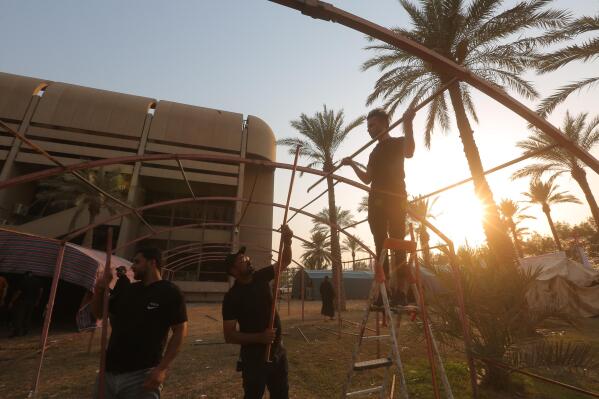Iraqi cleric calls for dissolution of parliament, early vote
BAGHDAD (AP) — Influential Shiite cleric Muqtada al-Sadr told followers Wednesday to continue their sit-in inside Iraq’s government zone, and called for the dissolution of parliament and early elections, signaling a deepening power struggle with his rivals.
Speaking for the first time since thousands of his followers stormed the parliament building in Baghdad on Saturday, al-Sadr said the “revolutionaries” must stay and continue their sit-in. He dismissed the option of engaging in dialogue with his political opponents in the Coordination Framework, an alliance of mostly Iran-backed parties, saying they did not bear fruit in the past.
“Don’t defer to their gossips that I don’t want a dialogue, because we tried dialogue with them but it didn’t result in anything for us or for the country. Dialogue with them has brought nothing but destruction, corruption, and dependency to the country, despite their pledges and signatures,” he said in a televised speech in the holy city of Najaf.
“There is no point of that dialogue, especially after people have spoken their free and spontaneous word.”
He directed his followers to vacate the parliament building on Tuesday but to remain in its vicinity. A mass prayer has been called for Friday inside the Green Zone, a heavily fortified district where the parliament and other government buildings are located.
Former Prime Minister Nouri al-Maliki, the head of the Framework and al-Sadr’s chief political rival, tweeted in support of continued dialogue based on the constitution.
“Serious dialogues, from which we hope to resolve differences and restore things to their rightful place, begin with a return to the constitution and respect for constitutional institutions,” al-Maliki tweeted.
Others welcomed al-Sadr’s call for early elections, including former Prime Minister Haidar al-Abadi who tweeted he “welcomed” the speech. He called for Iraqis to join serve the people and reform the system, “through a sound and peaceful democratic process,” he tweeted.
The Framework has painted al-Sadr’s followers as acting against Iraqi state institutions and called for counter-protests to defend them. Al-Sadr’s followers have not yet voiced a unified and coherent list of demands. They overran the parliament when the Framework took steps to form a government after naming Mohamed al-Sudani as their nominee for the premiership.
Sadr’s movement won the largest share of seats in federal elections last October. The cleric, along with his Kurdish and Sunni allies, called for a majority government that would exclude the Framework. But al-Sadr was not able to corral enough lawmakers to push ahead with the vote to elect a president, a key step before naming a prime minister. Out of frustration he ordered his 73 members of parliament to resign in June.
Now, emboldened in the aftermath of the ongoing sit-in that has brought the capital to a standstill, Al-Sadr hinted that appeals by his political rivals to negotiate did not bear fruit.
Shiite political officials said a proposal had been made requesting al-Sadr withdraw his followers from the parliament. In exchange the legislature would remain closed, inhibiting his rivals from forming a government without him.
Al-Sadr said fresh elections would get rid of “old faces” — referring to the establishment parties — including his own.
“I am confident that the majority of people are fed up with the ruling class entirely, including some who belong to the (Sadrist) movement,” he said.









